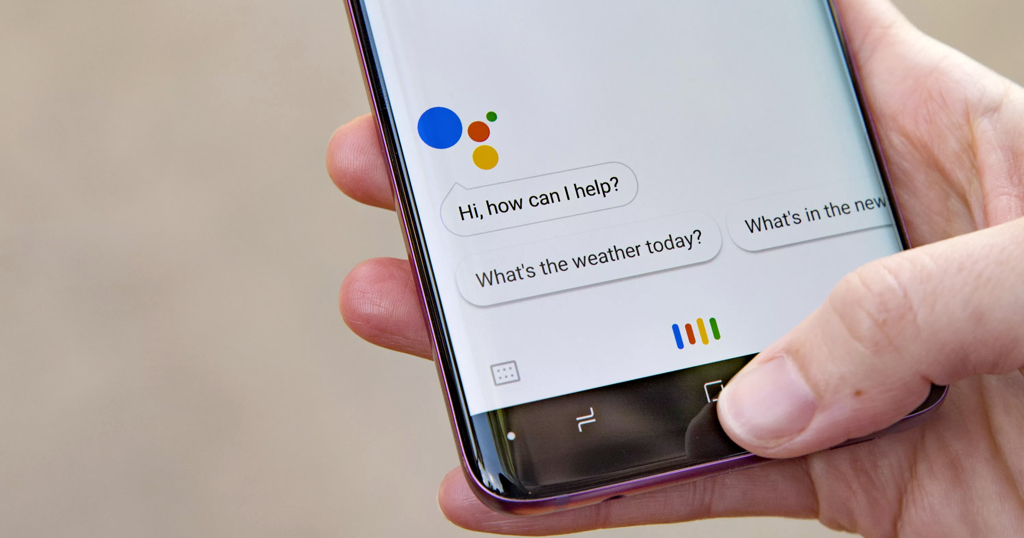Don't miss the chance to work with top 1% of developers.
Sign Up Now and Get FREE CTO-level Consultation.
Confused about your business model?
Request a FREE Business Plan.
Native vs. Hybrid App Development: Which is the right app for you?
Table of contents
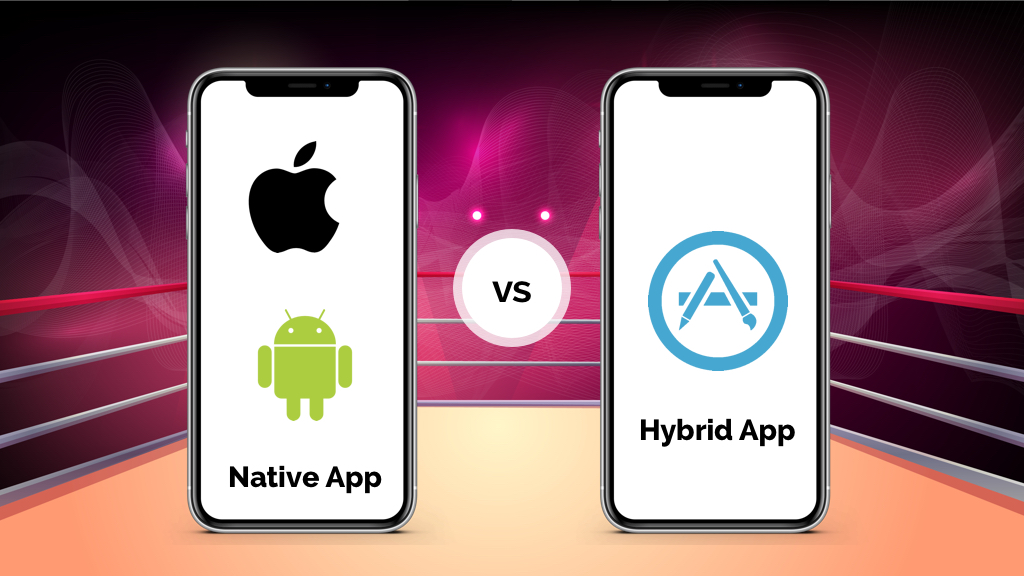
Planning mobile app development is not an easy task. In fact, there are so many things that you need to take care of when it comes to developing an app for your business. One of those important decisions is to find out which of the two – Native or Hybrid platforms is better for your business app.
In this piece of article, we, being one of the leading mobile app development companies are going to share our knowledgeable insights on the difference between Native and Hybrid apps. We hope this article will prove helpful to every business owner out there struggling to decide which among the two platforms is best for you.
So please stay with us and find out!
Before we explore the depth of this question, we must understand that mobile phones are driven by personalization. Your customer will have the device handy and your app, a few clicks away. Such a personal device must respond quickly and handle queries as soon as possible. It should be reliable and fast – this basic expectation drives the growth and fall of most mobile apps.
Key Takeaways From This Piece Of Article -
- What is the difference between the Native App & Hybrid App?
- Pros & Cons of Native Apps!
- Pros & Cons of Hybrid Apps!
- Which Platform To Choose & When?
Let’s begin!
What Is The Difference Between A Native App & A Hybrid App Development?
Whenever one talks about Native vs Hybrid apps, the first thing that comes to mind is the basic conceptual difference between the two. Native apps are the mobile apps that are developed for one particular platform say either iOS or Android whereas the Hybrid Apps have the cross-platform properties. With cross-platform, we mean that hybrid apps are capable of working over multiple platforms.
However, this is just the mere definition of these apps. Let’s dive a little deeper to understand more about both Native and Hybrid apps and their differences.
Native vs Hybrid App development – The Technical Differences
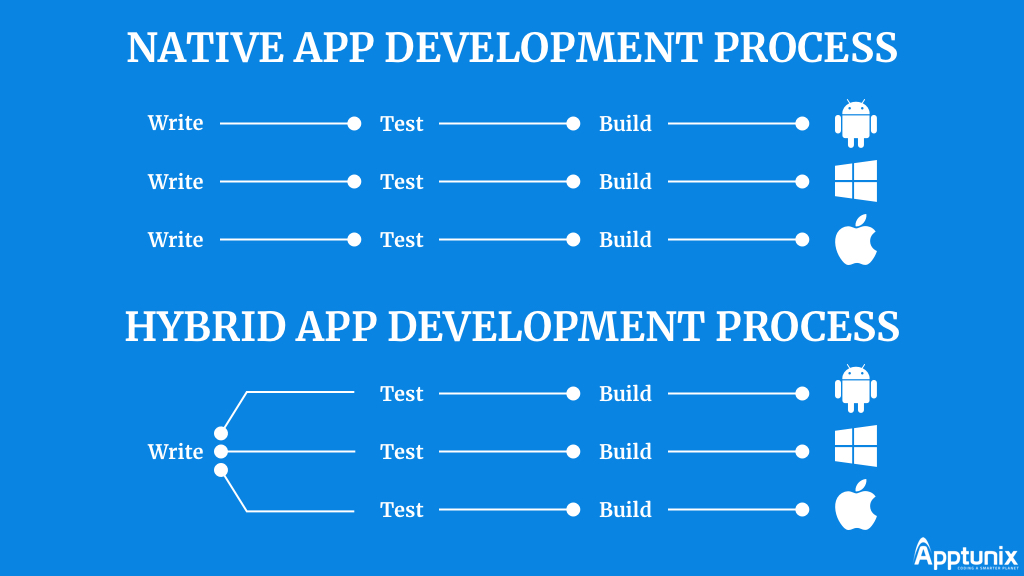
As we discussed, Native apps are designed over one specific platform iOS or Android apps. Technically, these are the apps that are programmed using the languages that are supported by the platform the app is being designed for. For instance, if one is creating a native app for android, it will be programmed using languages like Java or Kotlin and if the app is being developed for iOS platform it will be programmed using Objective-C or Swift.
Unlike Native apps when it comes to Hybrid Apps, technologies like Javascript, HTML, and CSS comes in handy. In fact, Hybrid apps are the websites that are the native apps that are designed to look and function like them. These apps use one code base for multiple platforms.
Cross-Platform Apps vs Hybrid Apps
Most of the people confuse hybrid apps with cross-platform apps. There are many obvious reasons behind that.
It is very difficult to understand the difference between cross-platform apps and hybrid apps. Still, we are going to try making you understand what differentiates between them both.
When it comes to cross-platform apps, the process includes the use of both web and non-web technologies. Unlike cross-platform apps, hybrid apps use frameworks such as Xamarin & Ionic.
Apart from this technical difference, both these apps hold the same properties.
Did You Know?
Uber App, Twitter App & even Instagram are Hybrid Apps?
What Are the Pros & Cons of Native Apps?
Native apps are programmed to work over a specific operating system. These apps are designed to stick to the specific guidelines that work well to enhance the user experience.
In this section, we are going to discuss several advantages and disadvantages of the Native app development.
Advantages of Native App Development
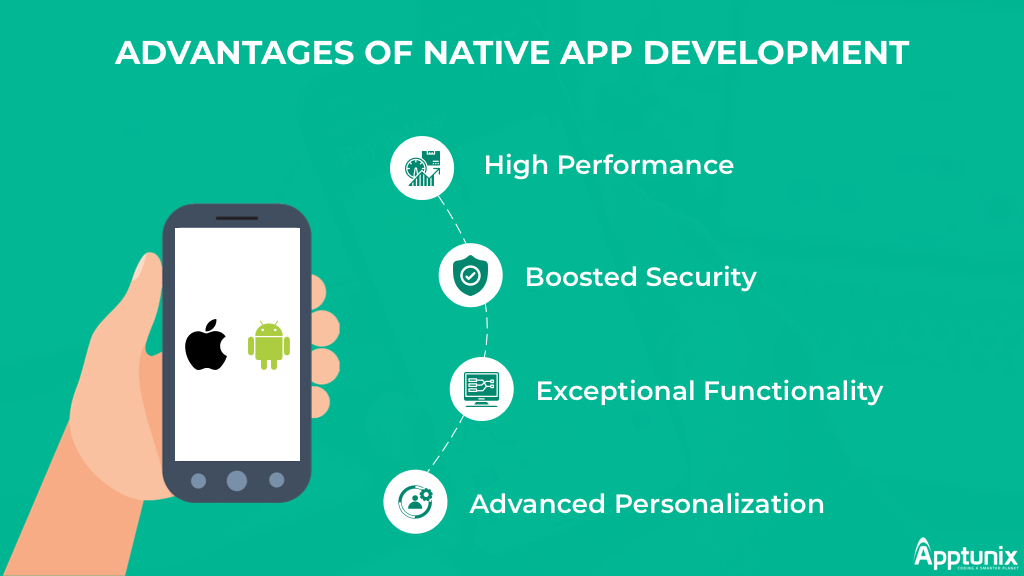
There are many advantages if you pick native app development over the hybrid one. In this section of the article, we are going to discuss what are the advantages if you choose to go with a native app?
- Enhanced User Experience
- High Performance
- Boosted Security
- Exceptional Functionality
- Advanced Personalization
These are some of the benefits that the choice of going for native app development entails.
Let’s discuss them one by one –
1. Enhanced User Experience (UX)
Enhanced UX is the major advantage of choosing a native app over a hybrid one. As every operating system has its own set of functionality and tailored language & gestures. During native app development, the programmers and designers can easily pay attention to all these unique set of gestures, elements, and languages.
Due to the focus set on a single platform, it becomes more efficient to understand the functionality of your application in a better way of improving the user experience. Apart from all this, with native apps, one can also make full use of offline mode capabilities, unlike hybrid apps.
2. Improved Performance
Whenever one talks about native vs hybrid apps, one should know that native apps have high performance. The reasons for this are quite simple.
When an app is designed for a particular OS or specific platform, an app can ensure to have high-performance metrics.
It is not just the optimization of a native app that contributes to the high performance but also the code itself is one of the factors.
Apart from all this, developing an app for a specific platform also makes it easy & fast for one to incorporate new features.
3. Boosted Security
One of the major advantages of native apps is the security it has to offer the users. Unlike hybrid apps, native apps can use the full power of the hardware boosting the security the app has to offer. This is the reason why native apps offer high data security.
4. Exceptional Functionality
Adding on to other benefits of native apps is the improved functionalities. The best part about native app development is the provision of full access to the databases. Unlike hybrid app development, access to the plugins is not limited to native apps.
Unlimited access to the plugins, features and more makes the choice of native app development a good choice.
5. Advanced Personalization
The native app development is one of the simplest ways to keep the designs at a high-level delivering a great user experience. Different devices have different fragmentations and therefore it becomes difficult to adjust the layouts. This is the reason why it is smart to choose a native app over a hybrid app.
There are always two sides of a coin. Now that we have discussed the major advantages of native apps, let’s talk about some of the disadvantages of them.
| Features | Native App | Hybrid Apps | |
| 1. | Device access | Full | Full |
| 2. | Performance | High/Fast | Medium/Good |
| 3. | Development Language | Objective C for iOS or Java for Android operating systems | HTML5, CSS and JavaScript |
| 4. | Development Cost | Expensive | Reasonable |
| 5. | Development Time | High | Medium |
| 6. | Offline mode | Supported | Not Supported |
| 7. | Maintenance | High | Medium |
| 8. | Speed | Very Fast | Good |
| 9. | Cross-Platform Support | No | Yes |
| 10. | User Interface | Good | Good |
| 11. | UI/UX | HIGH | Moderate |
| 12. | Advance Graphics | Moderate | HIGH |
| 13. | Security | High | Low |
| 14. | Code Portability | Low | High |
| 15. | Complexity | More complex to code | Less complex to code |
| 16. | User experience | Better user experience | Less user experience than native apps |
| 17. | Graphics | Better graphics | Lesser graphics than native apps |
| 18. | Portability | Harder to port to other systems | Easier to port to other systems |
| 19. | Integration | The camera, address book, geolocation, and other features native to the device can be seamlessly integrated into native apps. | Some device features may be harder to integrate into hybrid apps. |
| 20. | Internet Connection | Not Required Always | Required |
| 21. | Gesture Support | Yes | Yes |
Disadvantages That Native App Development Entails
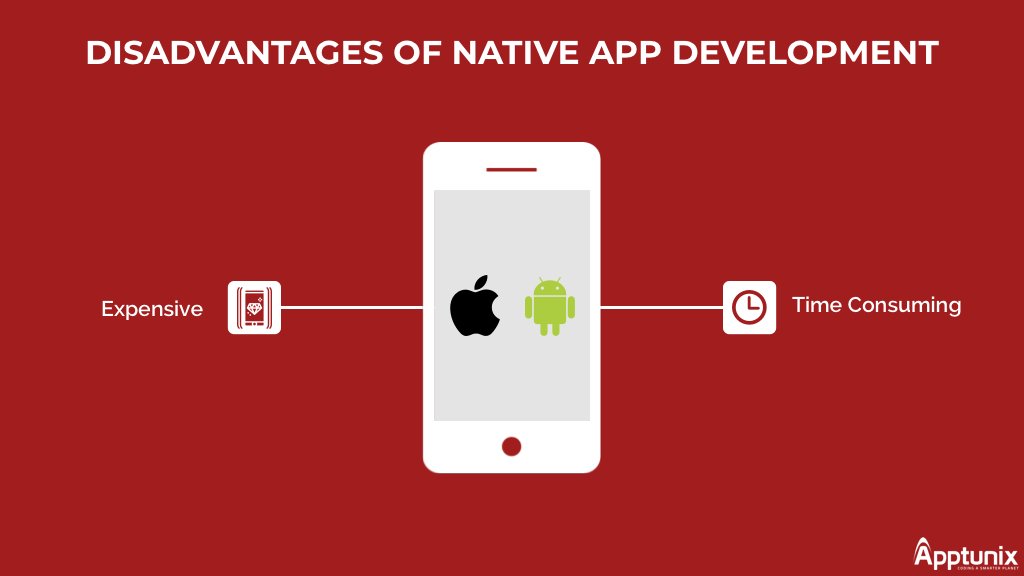
Like every other technology in the world, native apps also have both advantages and disadvantages. Below is the section where we are going to share some of the disadvantages of the native apps.
- Expensive
- Time Consuming
These are the two major disadvantages of going with native app development.
1. Expensive
As the process of developing native apps is a complicated one, the cost of doing so also increases. For the native app development, one needs to hire excellent resources and experienced native app developers, making the entire process but expensive.
2. Time Consuming
The native app usually requires more time to develop. This is because the app is designed separately for both the platforms – iOS and Android (if you need to develop it for both that is).
It seems like native apps have more advantages than disadvantages. Right?
Well! Before jumping to any conclusions let’s get into discussing what are the advantages and disadvantages of a hybrid app.
What Are the Pros & Cons of Hybrid Apps Development?
Before jumping into any conclusion on whether it is wise to choose a native app or a hybrid app, it is important to be aware of both the pros and cons of each of them.
Earlier in the above section, we have discussed the advantages and disadvantages of native app and now, we are going to do the same for hybrid apps.
As we have mentioned it once before, hybrid apps are basically websites that are packed into a native container to allow access to multiple platforms.
There are specialized APIs that are used in the process of developing Hybrid apps that restrict the capabilities of these apps.
So, without any ado, let’s talk about the pros and cons of a hybrid app.
Pros of Hybrid App Development That You Should Know Before Picking B/W Native vs Hybrid Apps
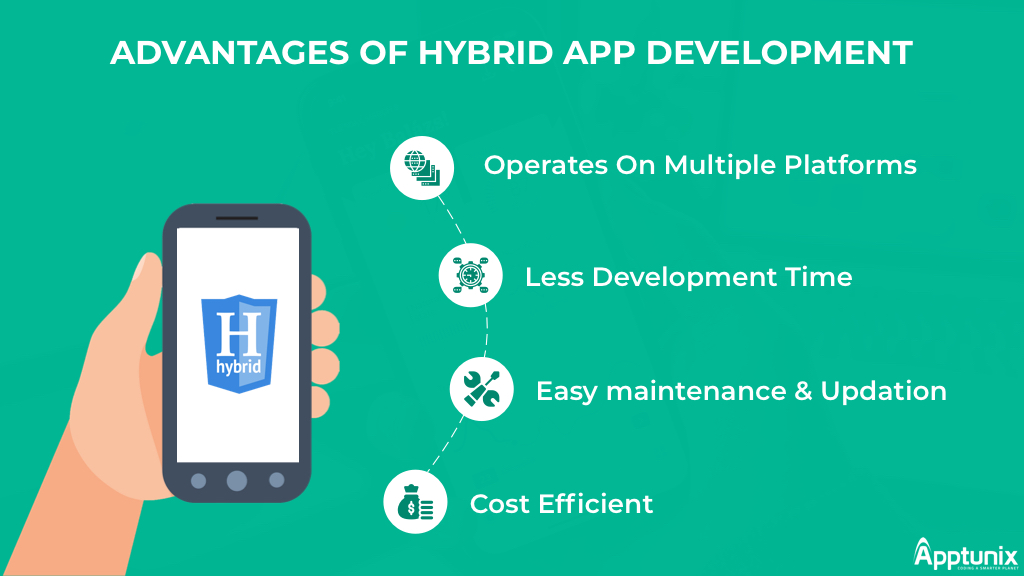
There are many benefits to going with hybrid apps. Below we have listed some of these benefits.
- Operates On Multiple Platforms
- Less Time Consuming
- Easy maintenance and Updation
- Pocket-Friendly
These are some of the basic advantages of hybrid apps. In the following section, we are going to discuss them one by one in detail.
1. Accessible Across Multiple Platforms
Hybrid mobile apps possess cross-platform capabilities. This is the fact that attracts many stakeholders to opt a hybrid app when it comes to choosing between hybrid and native app.
What this exactly means?
This exactly means that hybrid apps can run on both the platforms – iOS and Android with just one base code. This means that one does not have to develop two separate code for both the platforms, making it good for the clients with the objective of targeting a wider audience.
2. Development is Less Time Consuming
As one code file will operate on both the iOS and Android platforms in the case of hybrid apps, it becomes a very time-efficient solution. Unlike native apps where one needs to develop two separate apps for both iOS and Android, in hybrid the developer only needs to work on one single code.
Apart from the developer, the QA testing phase will also save a lot of time when it comes to hybrid app development.
Less Time, Cross-platform Capabilities, so far, it seems Hybrid is winning the native vs hybrid apps war.
3. Easy maintenance and Updation
Along with other aspects, when discussing native vs hybrid apps, the maintenance and updating also pitch in as a major difference. Due to the single code file in hybrid apps, it becomes quite simple and easy for one to edit and update the code which is not possible in native apps.
Whenever one needs to dive into code to make changes or fixing a bug, it becomes quite challenging in native apps.
Especially when one talks about it from the user experience end. In the hybrid app model, there is no need for the user to download the latest version if an app manually to fic the bug. Sounds convenient right.
Another point won by Hybrid apps in Native versus Hybrid apps debate.
4. Pocket-Friendly
Another point that attracts more and more stakeholders to opt for hybrid apps is cost-efficiency. As the process of hybrid app development only includes a single code to be built for both iOS and Android platforms, the development cost decreases effectively.
There are many hybrid mobile app development companies that operate on providing the best hybrid app development services.
These are some of the major advantages of choosing a hybrid app over native ones.
Now, let’s get to the other side of this. Let’s talk about the disadvantages of hybrid apps.
Cons of Hybrid Apps Development
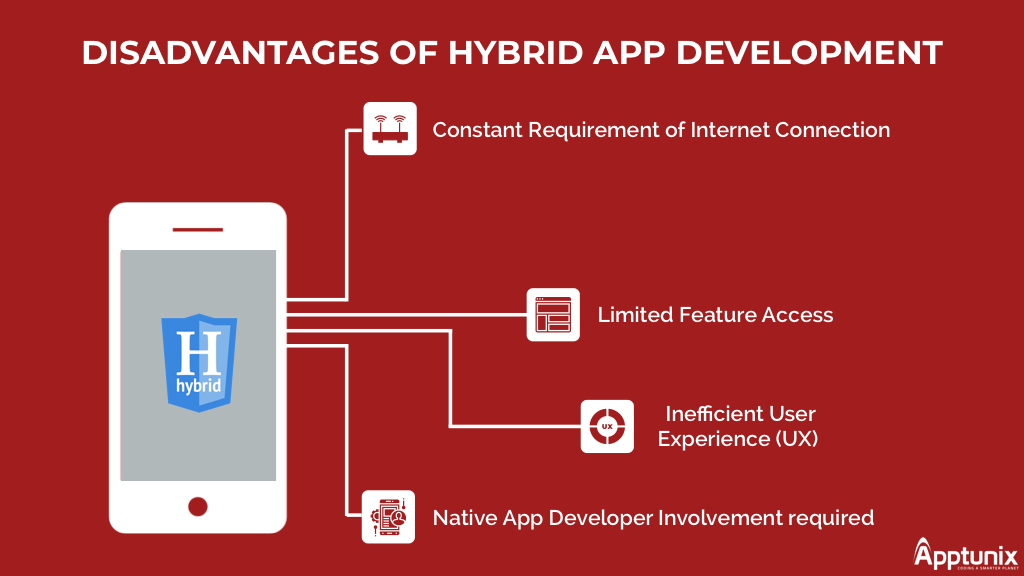
While talking about native vs hybrid apps, let’s get further into the comparison.
Let’s discuss the cons of hybrid apps.
- Constant Requirement of Internet Connection
- Limited Feature Access
- Inefficient User Experience (UX)
- Native App Developer Involvement
Mentioned above are the few points mentioning the Cons of hybrid apps.
1. Constant Requirement of Internet Connection
As we mentioned before hybrid apps are basically the websites. This is what makes it require constant internet connection to get access to all the major features.
Now, this might turn out to be a difficulty when implementing offline access to be a part of the app’s functionality.
Unlike native apps, hybrid apps take more time to load all the elements making the app work slower.
Less complexity and limited access to the features are the reasons why we said that hybrid apps are best suited for a content-oriented app.
2. Limited Feature Access
The entire process of hybrid mobile app development depends on the architecture that relies on plugins that access the built-in features of a device. What is the disadvantage? Well! There is a possibility that the plugins that the app is using might be outdated or simply unreliable.
Or another disadvantage, however, is that it might be the case that developers need to create new plugins on their own for any specific functionality that they need.
3. Inefficient User Experience (UX)
When it comes to native vs hybrid apps, the user experience plays a vital role in making the decision. Unlike the native apps, the UX in hybrid apps is not that strong. As the interface used here has to play well with both iOS and Android platforms, there are several compromises that need to be made.
For instance, if you focus on improving the user experience for the Android platform, the quality of UX decreases in the iOS version.
4. Native App Developer Involvement
What’s weirder is that in the process of a hybrid app development there is a need for a native app developer. This is because there are many functionality issues in hybrid apps that need to be solved and can be solved only by a native app developer.
Native vs Hybrid Apps | Which Platform To Choose & When?
We have mentioned several pros and cons of both native apps and hybrid apps above. In the following section, we are going to discuss which of these apps should you pick and when.
Let’s Start with Native Apps development.
Considering all the benefits and disadvantages of these native apps, one should pick native app when there is a need for custom features, high reliability, and great UX or design.
Now, let’s get to the Hybrid Apps development.
Unlike native apps, hybrid apps are perfect for simple content-oriented projects. Also, if you are low on budget, you can go for a hybrid option. These apps are also great if you have a time constraint. This kind of app is also perfect for MVP.
Summing It Up
In this piece of article, we have discussed several points including the pros and cons of both native and hybrid apps. Most people are always confused when it comes to makes a choice between native vs hybrid apps. In fact, many of people opt for a hybrid app just because of the lower cost, which indeed is not a great way to go.
We hope that this article was helpful.

In case you are still confused and have no clue what to do, Contact Our Consultants, and they will guide you through. With the experience of several years, our consultant has complete knowledge of the industry.
Rate this article!
(5 ratings, average: 4.80 out of 5)
Join 60,000+ Subscribers
Get the weekly updates on the newest brand stories, business models and technology right in your inbox.

Experiencing the journey with excitement, tackling the obstacles with the zeal to disrupt the vision of the world through her words is what defines the attitude of Vaishali Sonik. Vaishali a.k.a. Maggie took a turn from her Masters Journey in E.C.E to become an Internet influencer. Since 2014, she has been blending & molding her words to express the knowledge she has alongside learning herself at every step. She describes her profession as an Online Content Strategist & Writer, a way to learn something new at every step.

Telemedicine 2.0 - A Comprehensive Guide On What Healthcare Providers Need To Know?
Discover how the latest advancements like Artificial Intelligence in telemedicine are reshaping patient care. This comprehensive resource offers insights into the key trends and innovations driving this shift, providing valuable knowledge for healthcare professionals looking to stay ahead.
Download Now!Subscribe to Unlock
Exclusive Business
Insights!
And we will send you a FREE eBook on Mastering Business Intelligence.


